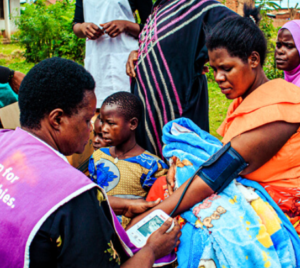Maternal health is vital to society. As the U.S. Department of Health and Human Services (HHS) has noted, maternal well-being affects the health of future generations. Whether or not mothers have access to adequate health care can have a substantial impact on an entire community.
Despite its importance, maternal health care has no shortage of challenges. According to the Centers for Disease Control and Prevention (CDC), each year in the U.S. approximately 700 women die due to complications associated with pregnancy or delivery. Additionally, more than 80% of deaths associated with pregnancy are preventable.
Maternal health care is complex. It encompasses aspects of both mental and physical health, and a range of social and economic factors significantly influences the accessibility and quality of maternal health care. Solving the issues that confront maternal health requires dedicated professionals who aspire to make a difference.
Nurses are especially well-positioned to have a positive impact on maternal health. Nursing professionals who seek to enhance their ability to support mothers can benefit from an advanced education.
What Is Maternal Health?
In simple terms, maternal health refers to women’s health during childbirth as well as during the prenatal (pregnancy) and postnatal (after delivery) stages. Fully understanding what maternal health is — and why it’s so important — requires an examination of the issues that can affect it.
Common Maternal Health Issues
All women should receive adequate maternal health care before, during, and after their pregnancies to avoid associated health issues. According to the CDC, some common issues include:
- Anemia, which can cause damage to internal organs
- Human immunodeficiency virus (HIV), viral hepatitis, sexually transmitted diseases, and tuberculosis, all of which can lead to serious health complications
- Hypertension, which can increase the risk of pregnancy complications
- Mental health conditions, which can make it difficult for a woman to properly care for herself and her baby
- Morning sickness, which can result in dehydration and weight loss
- Obesity, which can lead to pregnancy complications and stillbirths
Determinants of Maternal Health
Maternal health can be affected by a range of factors. According to the Mayo Clinic, examples of determinants of maternal health include:
- Carrying more than one fetus
- History of pregnancy-related issues such as premature births
- Lifestyles choices, such as smoking, using illegal drugs, or drinking alcohol
- Maternal age older than 35
- Preexisting conditions, such as high blood pressure, diabetes, epilepsy, or heart disorders
Socioeconomic and structural factors also are determinants of maternal health. A 2021 article in the Journal of Women’s Health cited the following influences:
- Educational attainment
- Ethnicity
- Financial barriers to receiving care
- Income inequality
- Lack of health insurance
- Lack of paid family leave
- Living in a racially segregated community
- Shortages of health care providers
Examples of Maternal Health Care Services
Maternal health care involves a vast array of services, addressing the needs of mothers at every stage of pregnancy and beyond. For example, HHS lists the following as types of care that are common in maintaining maternal and fetal health during the prenatal stage:
- Physical exams, blood tests, and calculations of due dates
- Prenatal tests to check for issues such as anemia, infection, gestational diabetes, hypertension, and birth defects
- Regular checkups throughout pregnancy to assess factors such as weight and fetal growth
- Ultrasound exams to review fetal organs and systems
The Cleveland Clinic offers these examples of health care that mothers receive during childbirth:
- Amniotomy to rupture the amniotic membranes
- Analgesics and anesthetics to relieve or block pain
- Episiotomy to ease delivery
- Fetal monitoring
- Services to induce labor
- Vaginal delivery assisted vaginal delivery, and cesarean birth services
The following are examples of maternal health care that the World Health Organization (WHO) recommends during the postnatal stage:
- Maternal nutrition and breastfeeding services
- Pain relief services
- Regular assessment of issues such as overall healing, urinary incontinence, fatigue, and back pain
- Services related to postpartum contraception
- Treatment for breast engorgement
Mental health screenings also are critical during the prenatal and postnatal stages. The American College of Obstetricians and Gynecologists recommends:
- Screening patients at least once during the prenatal stage for depression and anxiety
- Conducting a full assessment of a mother’s psychological well-being within the first 12 weeks of the postnatal stage
Why Is Maternal Health Important?
Exploring the impacts of poor maternal health helps to highlight the reasons why maternal health is important, including the human and economic costs associated with it.
Maternal Mortality Can Devastate Families
A 2022 article in BMC Pregnancy and Childbirth reported that maternal mortality can significantly affect the mental health and overall well-being of all members of the family. Specifically, the loss of a mother can result in surviving family members experiencing:
- Changes in family structure, such as children being sent to live in another home
- Complicated grief
- A decline in physical health
- Depressive symptoms
- Feelings of overwhelming sadness and emptiness
- Unemployment
- Strained finances
Maternal Morbidity Can Have Multiple Negative Consequences
Maternal morbidity — that is, health conditions that result from pregnancy or are made worse by pregnancy — also is accompanied by a range of unfortunate consequences. In 2021, the Commonwealth Fund published a report that found maternal morbidity can:
- Increase medical costs for years following a birth
- Increase the risk of children having chronic health conditions or behavioral and developmental disorders
- Lead to reduced productivity at work and unemployment
- Result in an increased need for social service programs such as the Supplemental Nutrition Assistance Program (SNAP) and Special Supplemental Nutrition Program for Women, Infants, and Children (WIC)
The Economic Consequences of Poor Maternal Health Care Are Substantial
In 2021, the Commonwealth Fund projected that maternal morbidity costs associated with children born in 2019 through their fifth birthday (in 2024) will total $32.3 billion. That total includes:
- Costs associated with children: $24 billion
- Costs associated with mothers: $8.3 billion
In its report, the Commonwealth Fund noted a scarcity of data related to maternal morbidity and its costs. The report specified that better data might indicate that the costs of maternal morbidity could be higher, perhaps even on par with the costs associated with chronic conditions that cost hundreds of billions of dollars.
The Critical Nature of Maternal Mental Health
Challenges related to maternal mental health are also significant. According to the Maternal Mental Health Leadership Alliance (MMHLA), mental health conditions represent the most common complications that women experience during pregnancy and following childbirth.
A variety of mental health issues can affect maternal health. The MMHLA reports that, during pregnancy or in the first year after pregnancy, changes in their environment, psychology, or biology will result in 1 in 5 women experiencing a mental health condition such as:
- An anxiety disorder
- Bipolar disorder
- Depression
- Obsessive-compulsive disorder
- Post-traumatic stress disorder
- A substance use disorder
The Consequences of Poor Maternal Mental Health
Poor maternal mental health can affect many other aspects of a mother’s life. For example, mental health issues can cause mothers to:
- Experience difficulty with breastfeeding
- Have poor nutrition
- Interact less with their babies
- Respond less to cues that their babies send
- Use drugs and alcohol
The babies of mothers who have mental health issues may also experience negative outcomes such as:
- Premature birth
- Excessive crying
- Emotional, cognitive, and behavioral delays
- Low birth weights
The Effects of Positive Maternal Mental Health
Conversely, babies can benefit when their mothers enjoy good mental health. A study published in the Journal of Child Psychology and Psychiatry in 2022 concluded that children born to mothers who maintained positive mental health throughout their pregnancies were less likely to develop behavioral and mental disorders.
Similarly, a study published in Psychiatric Services in 2021 noted that maternal warmth and strong maternal mental health can serve as a buffer that minimizes the relationship between economic hardship and negative child health outcomes. The study also concluded that providing cognitive behavioral mental health interventions to mothers through the Temporary Assistance for Needy Families (TANF) program could reduce mothers’ rates of depression and increase their rates of employment.
The Challenges Maternal Health Care Faces
When it comes to maternal health care, the challenges are significant. The following issues are just a few examples of the problems in maternal health care that will require current and future health care professionals to implement bold solutions.
High Maternal Mortality in the U.S. Compared to Other Countries
In a 2020 report, the Commonwealth Fund reported that the U.S. had a maternal mortality rate of 17.4 deaths per 100,000 pregnancies — roughly double the rate of most other high-income countries.
Examples of the leading causes of maternal mortality include:
- Blood clots
- Heart muscle disease
- High blood pressure
- Infection
- Severe postpartum bleeding
- Stroke
Many of these causes are conditions that, if identified early enough, can be remedied with clinical interventions.
Significant Racial Disparities in Maternal Health Care
The Commonwealth Fund noted that the maternal death rate for Black women (37.1) is 2.5 times the rate for white women (14.7) and three times the rate for Hispanic women (11.8). The report also noted that Black mothers who have a college education have a 60% greater risk of maternal death than white or Hispanic women who have less than a high school education.
Additionally, according to the report, Black women were more likely than white women to report that medical professionals disregarded them when they tried to discuss their health concerns.
The CDC notes that social determinants of health prevent people in minority groups from having equitable opportunities to receive health care. It also cites structural racism, implicit bias, and underlying chronic conditions as other causes for disparities in maternal health care.
Gaps in Health Insurance Coverage That Limit the Maternal Health Care Women Can Receive
Having health insurance before, during, and after pregnancy can have a notable impact on the health of mothers and their babies. In 2021, Health Affairs published the results of its analysis of new mothers who had Medicaid coverage for their prenatal care. The analysis found the following:
- Mothers who had no insurance before they became pregnant: 26.8%
- Mothers who had no insurance within two to six months after they gave birth: 21.9%
- Mothers who had no insurance both before and after their pregnancies: 34.5%
Having health insurance prior to becoming pregnant is important because it can help to prevent unintended pregnancies and can help women better manage chronic conditions before they become pregnant. Likewise, having health insurance after giving birth is vital because it can help new mothers continue to manage their chronic conditions and recover from giving birth, and help to prevent maternal deaths later in the postnatal stage.
Variations in Provider Availability That Leave Some Women Unable to Access Maternal Health Care
The March of Dimes reported in 2022 that 6.9 million women in the U.S. lived in “maternity care deserts” where there is a lack of resources for maternity care, there are no birth centers or hospitals, and there are no obstetric providers. Compounding those problems, these areas also lack broadband access, which reduces opportunities to receive telehealth services. Because of the lack of access to care in these areas, the risk for negative maternal health outcomes is higher.
Maternity care deserts are a particular problem in rural areas. According to March of Dimes, more than 61% of maternity care deserts are in rural counties. The report also noted that 181 rural hospitals have closed since 2005, increasing the risk that women will have to deliver their babies in hospitals that do not have obstetric care, or even outside of a hospital.
Initiatives Helping to Address Maternal Health Care Challenges
While the issues that confront maternal health care are substantial, certain efforts to promote maternal health have had a positive effect. For example:
- The California Maternal Quality Care Collaborative (an organization comprising stakeholders from multiple areas of maternal health) conducted research, developed tool kits for quality improvement, and performed outreach that resulted in a 65% reduction in maternal mortality in California from 2006 to 2016.
- On a global scale, KFF reports that the U.S. Agency for International Development (USAID) has implemented programs in 25 countries that have saved the lives of 340,000 women and 9.3 million children. Operating primarily in Southern Asia and Africa, these programs offer services such as emergency obstetric care, prenatal and postnatal health care, and nutritional assistance.
Nursing Careers in Maternal Health Care
Nurses who want to help address the issues that confront maternal health care have numerous career options.
Women’s Health Nurse Practitioner
For nurses who seek an advanced role, becoming a women’s health nurse practitioner can provide them with a great opportunity to contribute to improving maternal health. Women’s health nurse practitioners treat women throughout their life spans and focus on providing gynecological, obstetric, and reproductive care. In terms of maternal health, this can include offering services such as:
- Care after pregnancy
- Contraceptive care
- Evaluation of fertility
- Pregnancy testing
- Prenatal visits
Certified Nurse Midwife
Certified nurse midwives are involved in many aspects of maternal health care. While certified nurse midwives provide childbirth and delivery services, their services extend into many other types of maternal health care as well. For example, a certified nurse midwife can provide:
- Care during the course of a pregnancy
- Family planning services
- Gynecologic health care
- Preconception health care
- Sexual and reproductive health care
Labor and Delivery Nurse
A labor and delivery nurse is a specialized role in which a nurse guides a mother through labor, delivery, and the postpartum stage. After a baby is born, a labor and delivery nurse also typically provides care to both the mother and the baby. For example, labor and delivery nurses:
- Administer medications
- Assist in helping new mothers begin breastfeeding
- Develop customized care plans for mothers and babies
- Monitor the mental health of new mothers
Postpartum Nurse
Postpartum nurses focus specifically on providing care to new mothers and their babies after delivery. They teach new mothers self-care techniques and skills for nurturing their babies. For example, they:
- Educate new mothers about feeding and bathing their babies
- Instruct new mothers about umbilical cord care
- Offer specialized services to mothers whose babies are in a neonatal intensive care unit
- Treat postpartum conditions such as hemorrhaging, infections, and complications from cesarean births
Obstetrics Nurse
The services of an obstetrics nurse focus on the reproductive systems of female patients, providing care to mothers during pregnancy and delivery. For example, they:
- Advise patients about complications during pregnancy
- Conduct prenatal exams
- Perform patient assessments following delivery
- Prepare patients for labor and delivery
- Provide services to manage pain
- Offer education on making health-related decisions throughout a pregnancy
Working to Advance Maternal Health
Maternal health care is essential, not only to the lives of mothers and babies but to the general welfare of society. Because they play a vital role in promoting maternal health, nurses have the opportunity to help address the challenges mothers face in accessing quality health care and leading healthier lives.
Nurses who are seeking career advancement should explore Regis College’s online Master of Science in Nursing degree program to learn how it can help them pursue their professional goals. Offering six nurse practitioner specializations — including a women’s health nurse practitioner specialization — the program could set the stage for a rewarding career. Begin your career journey today.
Credit:: Regis College
Recommended Readings
10 Preventive Health Screenings for Female Patients
Understanding Nursing Roles During Early Pregnancy
What Impact Does Parental Mental Health Have on Children?
Sources:
American College of Nurse-Midwives, About the Midwifery Profession
The American College of Obstetricians and Gynecologists, Patient Screening
BMC Pregnancy and Childbirth, “‘There Is No Joy in the Family Anymore’: A Mixed-Methods Study on the Experience and Impact of Maternal Mortality on Families in Ghana”
California Maternal Quality Care Collaborative, Who We Are
Centers for Disease Control and Prevention, Maternal Mortality
Centers for Disease Control and Prevention, Maternal Mortality Rates in the United States, 2020
Centers for Disease Control and Prevention, Pregnancy Complications
Centers for Disease Control and Prevention, “Working Together to Reduce Black Maternal Mortality”
Cleveland Clinic, Pregnancy: Types of Delivery
The Commonwealth Fund, “The High Costs of Maternal Morbidity Show Why We Need Greater
Investment in Maternal Health”
The Commonwealth Fund, “Maternal Mortality in the United States: A Primer”
Health Affairs, “Post-ACA, More Than One-Third of Women with Prenatal Medicaid Remained Uninsured Before or After Pregnancy”
Incredible Health, “Become a Postpartum Nurse in 3 Steps”
Indeed, “What Is a Labor and Delivery Nurse?”
Indeed, “What Is an Obstetrics (OB) Nurse? (And How to Become One)”
The Journal of Child Psychology and Psychiatry, “Positive Maternal Mental Health During Pregnancy and Mental and Behavioral Disorders in Children: A Prospective Pregnancy Cohort Study”
Journal of Women’s Health, “Social and Structural Determinants of Health Inequities in Maternal Health”
KFF, “The U.S. Government and Global Maternal and Child Health Efforts”
March of Dimes, “Nowhere to Go: Maternity Care Deserts Across the U.S.”
Maternal Mental Health Leadership Alliance, Fact Sheet Maternal Mental Health
Mayo Clinic, High-Risk Pregnancy: Know What to Expect
Psychiatric Services, “Improving Maternal Mental Health as a Pathway to Economic Mobility in the TANF System”
U.S. Department of Health and Human Services, Maternal, Infant, and Child Health Workgroup
U.S. Department of Health and Human Services, Prenatal Care and Tests


























































3 Responses
….
Hllo mmy friend! I wish to say that this post is awesome, nice written and come
with almost all important infos. I’d like to see extra posts like this . https://WWW.Waste-Ndc.pro/community/profile/tressa79906983/
Thanks for your appreciation Martha!